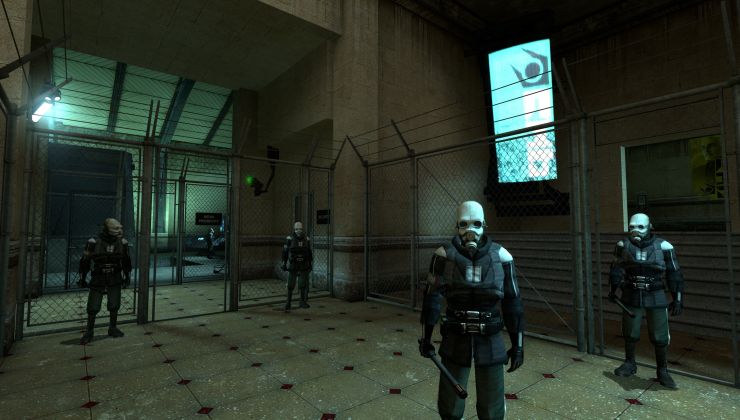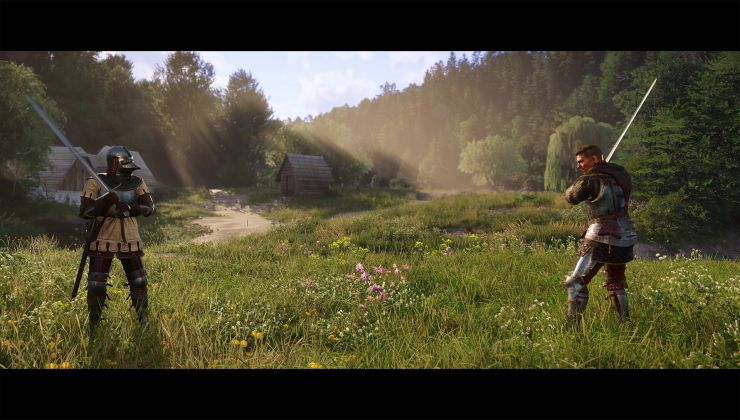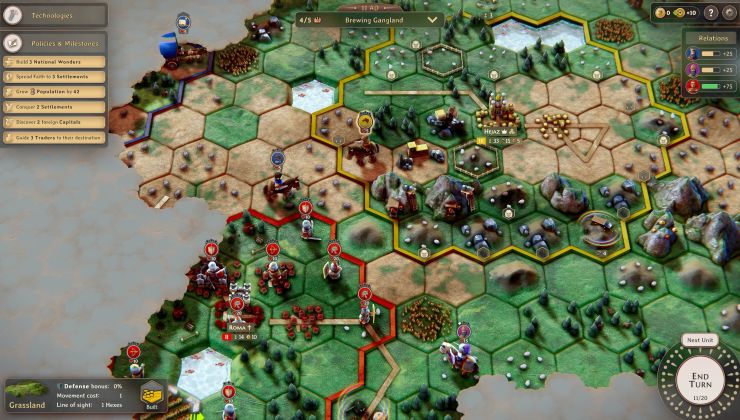Update: Canonical are now saying 32bit libraries will be "frozen" and not entirely dropped.
Original article:
Things are starting to get messy, after Canonical announced the end of 32bit support from Ubuntu 19.10 onwards, Valve have now responded.
Speaking on Twitter, Valve dev Pierre-Loup Griffais said:
Ubuntu 19.10 and future releases will not be officially supported by Steam or recommended to our users. We will evaluate ways to minimize breakage for existing users, but will also switch our focus to a different distribution, currently TBD.
I'm starting to think we might see a sharp U-turn from Canonical, as this is something that would hit them quite hard. Either way, the damage has been done.
I can't say I am surprised by Valve's response here. Canonical pretty clearly didn't think it through enough on how it would affect the desktop. It certainly seems like Canonical also didn't speak to enough developers first.
Perhaps this will give Valve a renewed focus on SteamOS? Interestingly, Valve are now funding some work on KWin (part of KDE).
Looks like I shall be distro hopping very soon…
To journalists from other websites reading: This does not mean the end of Linux support, Ubuntu is just one distribution.
Should they work for me for free? Why?
Miss the point much? I'm not talking about getting stuff for free; it's the oddity of the fact that the subscription model comes to mind as the first example for 'supported software', and for an operating system no less.
In the enterprise, companies pay fees for a wide range of rights, including calling the developers themselves to fix & recompile a bit of software when something goes wrong. However in the consumer space, the 'subscription model' merely deigns to allow basic usage -- I consider things like security updates within the scope of 'basic usage' -- only as long as the payments keep coming in. Unlike the enterprise support model, it's an arbitrary constraint on your rights over the hardware you own.
Consumers 'renting' software appears to be becoming 'normal'; that's what's unsettling.
-- also, although beside the point, I've also made small contributions to open source projects that I depend on; and I'm hoping to do more once I straighten out my financial situation. (Including supporting this website obviously.)
Maybe it's too soon. Maybe it should have been handled differently. But the notion that the entire backlog of the history of gaming should be forever kept able to run across all future generations of operating systems... It's just dumb.
If you want to run old software, keep an old OS on your drive. Just like if you want to play your cassettes, keep a cassette player.
Not just old OS, you need to use an old hardware as well. Forward compatibility of the drivers in your OS only goes so far.
Slackware you have a 32-bit version or a 64-bit version.
The 64-bit version is pure 64-bit. If you want to get 32-bit support you have to install these packages: http://www.slackware.com/~alien/multilib/. This also gives you the ability to compile/install other 32-bit stuff if you so need to. Apart from that it just stays quietly in the background.
There are 10,000+ old Windows games that need 32-bit support to run.
Well, I'm neither a Steam user, nor a *buntu one, so I basically don't care much. But yeah, Valve being unable to deliver 64bit Steam is part of it too, although many of the games are 32bit only, yes. But that doesn't mean Valve should be encouraging the use of 32bit anachronism.
I read in one of the comments that most people consider Linux to be Ubuntu. People meaning non-linux users? Because most of Linux users are not gamers at all and really not *buntu users either. Really.
I'm no fan of Debian either for that matter, for various reasons, including package management and actually the way multilib works in Debian based distros. Frankly, it's sort of nightmare.
And Canoncial = Shuttleworth. A guy who's words are lacking truth much more often then I'm personally comfortable with.
So, maybe time for celebration after all? No thing or occurrence is by definition negative, only someone's specific opinion makes it so you know ;)
So, yeah, nice times, keep it up Mark, all is on a good way! :D
I stopped using Ubuntu years ago over Canonical's jerk-wad behavior; the fact that I had problems with their quality control was only icing on that cake (LTS tended to be too old/too problematic, current always managing to break just enough that I had to fix my desktop every four months). I love Mint as being the "good" derivative that I rarely have to fix during normal usage/updates (My preference is Mint XFCE), and it pays to remember they have a Debian/Rolling non-ubuntu based version. I'd be all over their "LMDE" if it became their flagship, I've not adopted it yet simply because I've always suspected it'll get dropped once it becomes too much of a technical debt.
I remember when Windows dropped 16bit support for full 32bit... Goodbye some of my most loved win95 games !
And I'm still alive.
32 bit will die this way too. We'll have to say goodbye to our old stuff ( and I'm not very pleased with oscilloscope and other tools working only on 32bit windows like someone earlier ).
I guess we'll rely on virtual machines... The problem is the hardware emulation. It will take a long time to get something generic that will run a good chunk of the 32 bit era games...
I still have my old corde2duo computer and a very old AMD sempron based computer because I knew this was coming.
In the future no so far, we'll even have to change from the x86 to something else and we won't be able to run x86 stuff at all. ( that's why we're still on it, we should have changed to something else because we're reaching the end of what we can do with the x86 from what I heard and understood )
If support for 32bit libs had been ended a while ago, we wouldn't be in this situation today.
The easy availability of 32bit libraries is pushing app developers to distribute 32bit executables, which needs to stop.
Every time I see this view expressed I have to wonder how shortsighted people have to be to not understand the implication of this.
We're not talking about future executables. We're not talking about current, and actively maintained executables. This is Gaming on Linux, we're talking about games. And more specifically, games which were created for another OS.
[Here is my Steam game list](https://steamcommunity.com/id/Greyed/games/?tab=all). There are 465 games on my account, the vast majority of which were purchased when I ran Windows. I've got the 15 year badge on there, so I have games going back that far. Further when you count the re-purchases of far older titles. How many of those do you think are going to update to 64-bit any time soon?
That is what the uproar is about. It is knee-capping a breakthrough we had less than a year ago which got lots of people to finally consider, and accept, Linux as a viable gaming platform.
Last edited by GreydMiyu on 23 Jun 2019 at 12:43 am UTC
Should they work for me for free? Why?
Miss the point much? I'm not talking about getting stuff for free; it's the oddity of the fact that the subscription model comes to mind as the first example for 'supported software', and for an operating system no less.
Hmm, I understood the OP in the way, that this is an optional thing. You can pay if you want to support.
Perhaps I understood that wrong. But I did not mean a "forced" but a "if you like to support us" payment.
So I would give them money. A "supporter" Pack, that you can buy as often as you like could also be a good idea.
If you are pleased and you can effort --> you can support.
I agree with you, that it should never be mandatory to pay in this way.
I think this is a big setback for Linux gaming.
18:04 will probably be installed on my PC untill support ends.
we're reaching the end of what we can do with the x86 from what I heard
And where did you hear that exactly?
Last time I checked ISA's don't matter much on modern microarchitectures.
we're reaching the end of what we can do with the x86 from what I heard
And where did you hear that exactly?
Last time I checked ISA's don't matter much on modern microarchitectures.
tell that to licensees of ARM, ROFL x3
Embrace, extend, and extinguish in its modern form.
After all, Mark has been in bed with WSL2 and grooming the company for a buyout. Microsoft gets to maintain their monopoly of the OS market. Influence the Linux sector. And take a blow at Valve all at the same time for pennies on the dollar.
At least Redhat IBM buyout was 34 billion, I wonder what Canonical will sell for as they're gearing up for a buyout.
2022: Microsoft repackages the .NET and Direct X layers and redeploys win32 on Ubuntu and renames it Windows 11 which includes binary blob kernel backdoors, a ssh master key and keylogger.
2023: Cortona becomes self aware.
2024: The United States of Earth tries to pull the plug on Windows 11. Windows 11 fights back by launching the nuclear missiles to destroy their targets in Russia.
Edit: Obligatory [Beastie Boys - Sabotage](https://www.youtube.com/watch?v=z5rRZdiu1UE) Microsoft plug, they have manipulated the situation with the skill of a Romulan and I salute their prowess.
Last edited by ElectricPrism on 22 Jun 2019 at 11:52 pm UTC
MacOS as different case. When Apple remove 32bit support, there is no other way.And? I still do not see the arguments why Valve should continue to support macOS. Not only because of the rejection of 32-bit support, but in general.
Steam is already 64bit on macOS, and has been since last year.
There is a bug where some people’s clients don’t update properly, but that’s a separate issue.
Steam itself is good to go.
tell that to licensees of ARM, ROFL x3
ARM's ISA has very little to do with the efficency of their CPUs, it's mostly (all?) due to the microarchitecture designs.
The best ARM implementation is currently Apple's A12, and here's the reason why it's so efficient:
https://www.reddit.com/r/apple/comments/9midcx/apple_really_undersold_the_a12_cpu_its_almost/
TL;DR: it's very wide with a very big cache, nothing to do with the ISA.
There's no need to change the x86 ISA and break the compatibility with every piece of software written in the last 40 years.
EDIT: fun fact, Intel will go wider with their next uarch Sunny Cove, we will see how that will go (probably very well) and how AMD's Zen3 will respond.
Last edited by whatever on 22 Jun 2019 at 11:48 pm UTC
tell that to licensees of ARM, ROFL x3
ARM's ISA has very little to do with the efficency of their CPUs, it's mostly (all?) due to the microarchitecture designs.
The best ARM implementation is currently Apple's A12, and here's the reason why it's so efficient:
https://www.reddit.com/r/apple/comments/9midcx/apple_really_undersold_the_a12_cpu_its_almost/
TL;DR: it's very wide with a very big cache, nothing to do with the ISA.
There's no need to change the x86 ISA and break the compatibility with every piece of software written in the last 40 years.
EDIT: fun fact, Intel will go wider with their next uarch Sunny Cove, we will see how that will go (probably very well) and how AMD's Zen3 will respond.
wasn't tl, but i won't take this too far off-topic
To journalists from other websites reading: This does not mean the end of Linux support, Ubuntu is just one distribution.
Isn't it saaad that you FEEL you HAVE to precise that at the bottom of your article ?
Like for real this is the epidemy of "Hey you'll want to pull some shenanigans you can't use my ass for this shit fuck off find another pigeon for this"
Personnaly I hope they will go Pop!_OS even if they recently stated that they grow tired of the whole debian echo system and build system . Sorry not sorry but I never had great experiences with any non debian based distros on the desktop side of things .
So I really really hope they stick with a debian based system and Pop!_OS is the best solution really . Hell they are already better than Ubuntu on some various things .
Pop!_OS is the best solution really . Hell they are already better than Ubuntu on some various things .Not sure -they probably are, but they are also a bit small, based on Ubuntu and unfortunately ship only the gnome desktop - so maybe something more...diverse ;-) concerning DEs and a little more upstream. I would love to see Mint but they have a similar situation. openSUSE may actually not be a bad idea.













 How to set, change and reset your SteamOS / Steam Deck desktop sudo password
How to set, change and reset your SteamOS / Steam Deck desktop sudo password How to set up Decky Loader on Steam Deck / SteamOS for easy plugins
How to set up Decky Loader on Steam Deck / SteamOS for easy plugins
See more from me